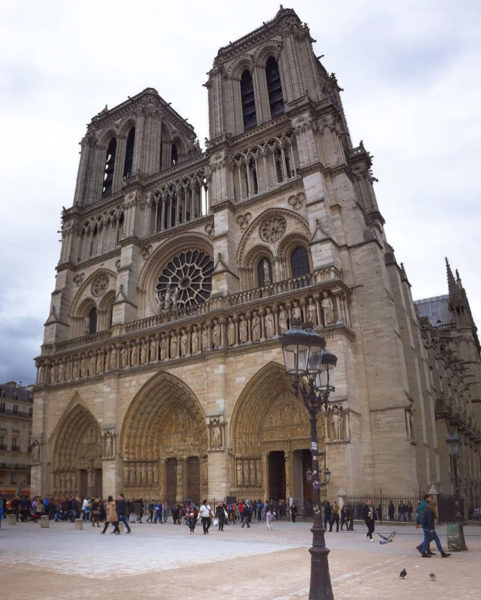Last year, while I stayed at home for spring break, my sister and mother explored Paris. Each day they would tell me about the places they visited, and one of them was the Notre Dame. Although I had never seen the cathedral, I knew it was special. A year later, I checked my phone and saw a text from my dad: “The Notre Dame is on fire.”
The 856-year-old cathedral burned on April 15, causing its well-known spire to collapse through the building. There are many theories on what started the fire, such as a possible electrical short-circuit or human renovation mistake.
Approximately $950 million was donated just two days after the tragic accident.
Many French philanthropists chipped in large sums of money to the repairs of the sacred Paris monument. Ultimately, hundreds of millions of dollars were raised for the rebuilding of the Notre Dame, which may take years to decades to recover. French President Emmanuel Macron asked for pledges to rebuild the landmark and vowed to rebuild the church.

In a Washington Post article, foreign affairs reporter Rick Noack said, “Notre Dame may have too much money after billionaires and others rushed to pledge.”
It’s hard to relate to because the Notre Dame isn’t something most Californians think about in their daily life. In an attempt to think about the perspective of the Parisians, think about how you would feel if the Golden Gate Bridge collapsed. I would hope that money would be raised to repair the damage. Would the people of San Francisco accept a bridge that did its job as a bridge but wasn’t the same red-orange color? Would you care if the Golden Gate Bridge was replaced and replicated to look the exact same as it had? San Francisco’s skyline and reputation just wouldn’t be the same without the iconic bridge because people associate great places with great buildings.
There has been some backlash to the raising of money in a short amount of time for the Notre Dame.
In State News, a column written by Emily Ludwa was titled: “Column: Notre Dame doesn’t need more money, donate to more important causes.”
The article brings up questions like, “Why was money raised so quickly for the Notre Dame, and why aren’t the severe crises happening everyday receiving the same attention?” I think because France is well known, higher society members with the economic ability contributed to the raising of money towards the rebuild.
Africa is currently facing severe food shortages — the worst since 1945. But if you asked an American if they heard about the food crisis in Africa or the burning of the Notre Dame, they would most likely know about the French tragedy.
In today’s world, and especially in the Bay Area where life is moving at a fast pace, Californians often forget about the countries in poverty. France is not as poor as other countries, yet, once the Notre Dame burned, millions of dollars were donated in much less than a month. Big-branded business owners pledged millions of dollars. The average Bay Area resident is not a billionaire, yet most of the inhabitants are not dealing with a food shortage either.
To think in the mind and heart of a Parisian, I would want my community and country to display its patriotism and to rebuild the landmark that was destroyed. If a classroom in Aragon was burned down, it would be replaced and rebuilt because it is a part of the campus. That can be the same for France; France’s map has a spot for the Notre Dame.
Yet, if there really is enough money and resources raised for the rebuilding of the Notre Dame, then I think France has the ability to be a global hero and make a drastic change in the world by donating the excess money to underprivileged communities around the world. If there is excess capital, France should share the wealth.
Is patriotism bad? No — but people should also be informed about the destruction happening all over the world every day, and how they can help those who don’t have the same resources they do.



